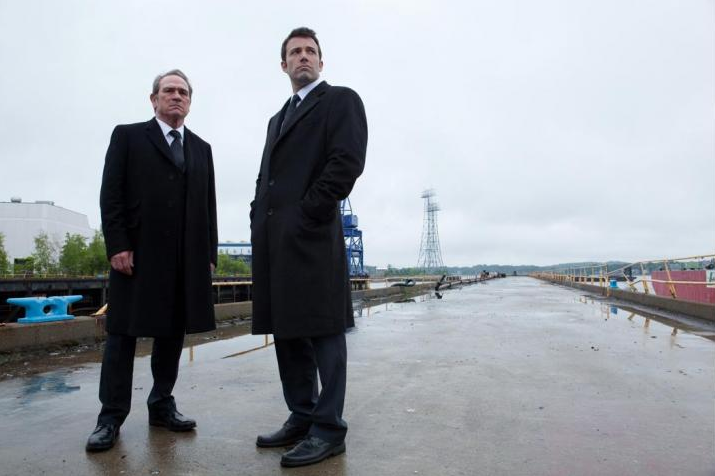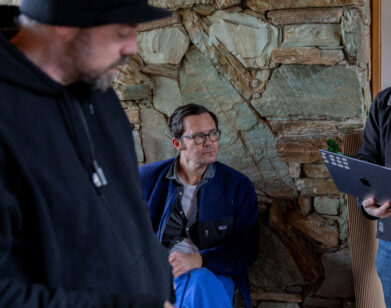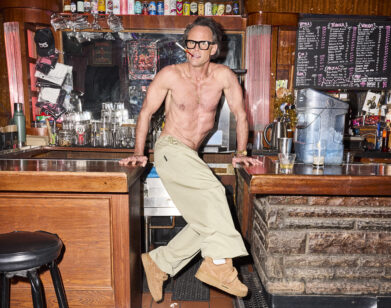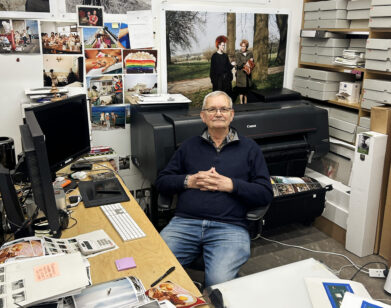John Wells’ The Company Men: Beyond the Gray Flannel Suit

TOMMY LEE JONES AND BEN AFFLECK IN JOHN WELLS’ THE COMPANY MEN.
STILL COURTESY OF WEINSTEIN CO.
With the constant droning about financial forecasts and stock prices, it can be easy to forget just how sudden and scary our financial fall was only two years ago. The new film The Company Men, directed by John Wells, takes us back to the moment when the financial rug was pulled out from under us. The film follows Ben Affleck, Chris Cooper, and the perfectly unhappy Tommy Lee Jones as three executives of varying VIP status navigating unemployment, with a surprise appearance by Kevin Costner as a blue-collar carpenter. Known for his extensive television producing credits, from ER to The West Wing, Wells came up with the idea for this, his film-directing debut, a decade ago during the dot-com bust. While The Company Men has a few hallmarks of a traditional redemption story, there is plenty of darkness to keep the film from wrapping up the 9.8% unemployment rate with a bow. One discussion in particular, on job efficiency in corporate culture, might elicit chills. We caught up with Wells in New York, where he talked about transitioning from producer to director and getting his dream cast.
MOHNEY: I heard you wrote the script actually a decade ago. Can you talk about developing the story?
WELLS: The impetus was my brother-in-law, my sister’s husband, who had a wonderful education and a wonderful career as an electrical engineer. Then, along with 5,000 other people, he lost his job on a Tuesday—through no fault of his own. The company had merged. He started telling me what he was going through, and his experiences in outplacement services. I got interested in it, and I interviewed a couple hundred people, and I went into chat rooms and posted, “I want to write about this, do you have an anecdote about it?” The first week, I got 2,000 responses. So there are a lot of these people out there. I wrote the script for Warner Brothers during the dot-com years. But by the time I turned it in, the recession was over, and no one wanted to see it. When things got rough again in 2007, I went back and looked at it. I talked to more people to make it more contemporary. Then [I] found out we were shooting it in the worst recession since the Great Depression. When we were shooting it, we thought we were going to release it as a historical document. “Here’s what happened, and now we’re all out of it.” But [not quite].
MOHNEY: How did the script change in the 10 years?
WELLS: The emotional undercurrents are the same. And I think it would have been the same if you were writing it in the 1940s. All of the details and the financial details and how outplacement works changes every few years… I was rewriting every day on the set to [the changing] financial news that was coming in. Finally, we had to set it in a time and place. Originally, the carpenters in the piece were going to be building new homes. But at the time we shot it, there were no new homes, so we changed it to remodeling. Now, I probably would do something else completely different, because those guys aren’t working. You do have finally pick and time and place and set it down.
MOHNEY: Can you talk about casting, since you had Ben Affleck, Chris Cooper and Tommy Lee Jones as the three leads for the different narratives, and also Kevin Costner in a supporting role?
WELLS: I got really lucky with casting. Producing small films, you usually have four or five people you want, and you hope one of them will say they’ll do it. And everybody I asked said they would do it. It was wonderful, and I don’t want to get used to it. And Kevin Costner really came out of the blue. His agent had sent him a script and then called me and said, “Kevin is really interested in doing it, he wants to play this Jack guy.” I had written [Jack] with Kevin in mind, never thinking that Kevin would do it. I had written, “It should be a Kevin Costner [type].” That’ll never happen again.
MOHNEY: It’s your directorial debut—can you talk about how that’s been for you?
WELLS: You know, someone said to me earlier, “Why did you hire three really good directors to be in this piece?” And I was like, “Oh God, I did!” But everybody was great about it, because they knew on this schedule-a forty-day shooting schedule. They all looked at that and were like, “Good luck, we’ll show up. We’ll be there!”
MOHNEY: Did the producing side of your brain ever take over?
WELLS: I did on occasion. A few different times, [producer] Barbra Hull would come over and say, hilariously, “Let me produce the picture. You just direct today.”
MOHNEY: A lot of these stories are real, or people who will watch them will have been through something similar. Did you take that into account when you were shooting?
WELLS: So much of the script is based on stuff that people have sent to me. I tried to be very sensitive to the integrity and the honesty in their stories. A perfect example is the scene inspired by a story—when it was told to me, [the person] was crying and laughing at themselves about it. It’s a scene where Bobby, Ben Affleck’s character, finds out his 12-year-old is upset. Bobby hasn’t told him he lost his job yet, so he tells his son he lost his job and the son is relieved! He’s like “Why are you relieved?” And the son says, “I thought it was you and Mom. I thought you were getting a divorce.” Trying to keep the emotional integrity was important. These are real stories.
THE COMPANY MEN WILL PLAY DECEMBER 13 AT THE DUBAI INTERNATIONAL FILM FESTIVAL, AND OPENS IN THE UNITED STATES ON JANUARY 21, 2011.






